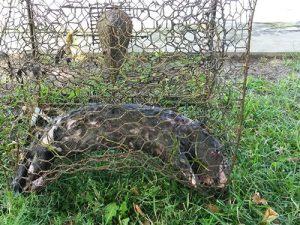
OCEAN CITY — The Maryland Coastal Bays Program (MCBP) this week is again reminding recreational crabbers to utilize by-catch reduction devices on their traps after a dead river otter was recovered from a crab pot last weekend.
An abandoned crab pot found near a marsh last weekend did include a few crabs, but also contained a grim surprise. The Ocean City Police Department (OCPD) last weekend received a call from a concerned resident who noticed an abandoned crab pot that appeared to contain something suspicious. An OCPD Animal Control officer responded to the call, pulled the crab pot from the marsh and discovered a young river otter had apparently entered the pot seeking food, could not get back out and drowned.
The grim discovery led to the MCBP this week re-issuing a reminder to recreational crabbers to include by-catch reduction devices (BRDs), sometimes called turtle excluder devices (TEDs) on their crab pots. The device is a simple metal or plastic piece that is installed at each entrance of the crab pot that allows crabs to enter and be retained, while preventing larger animals such as river otters and terrapins, for example, from entering the traps. Last summer, a single abandoned crab pot pulled from Assawoman Bay contained over 20 dead terrapins.
Recreational crab pots are required by state law to have BRDs installed at each entrance. However, it’s tough to enforce and many retailers sell crab pots without the devices, leaving it up to the individual recreational crabber to install them. Some eco-conscious retailers have made a policy to sell only crab pots with the TEDs and BRDs installed, but it’s largely the responsibility of the individual recreational crabber.
Maryland law allows only those individuals with commercial crabbing licenses to deploy crab pots in open water. The recreational use of crab pots is restricted to a dock and is limited to just two pots per dock. TEDs are required at each entrance to the crab pot and those who don’t comply can be fined up to $1,000.
This spring, the MCBP partnered with local watermen and volunteers to remove marine debris with a focus on abandoned crab pots from the coastal bays. A total of 55 abandoned “ghost pots” were removed from the bays over a two-day period in March. There are several reasons crab pots become “ghost” pots and need to be removed from local waters on an annual basis. Often, they become abandoned only when careless boaters fail to yield to floats in the bays, marking the location of the pots, and cutting the float.
The MCBP has a limited number of TEDs available to the public for free. To make arrangements to pick up the devices at the MCBP office, call 410-213-2297.

